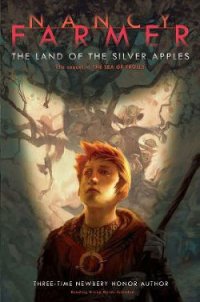Tehanu The Last Book of Earthsea - Le Guin Ursula Kroeber (серии книг читать онлайн бесплатно полностью .TXT) 📗
“With the widow, yes.”
Ged put his face in his hands. She waited.
He looked into the fire, and went on steadily. “Then I lost them for a while. The road came out level into the valley, and I couldn’t follow along the way I’d been doing, in the woods, just behind them. I had to go aside, through the fields, keeping out of their sight. I don’t know the country here, only the road. I was afraid if I cut across the fields I’d get lost, miss the house. And it was getting dark. I thought I’d missed the house, overshot it. I came back to the road, and almost ran into them-at the turn there. They’d seen the old man go by. They decided to wait till it was dark and they were sure nobody else was coming. They waited in the barn. I stayed outside. Just through the wall from them.”
“You must be frozen,” Tenar said dully.
“It was cold.” He held his hands to the fire as if the thought of it had chilled him again. “I found the pitchfork by the lean-to door. They went around to the back of the house when they came out. I could have come to the front door then to warn you, it’s what I should have done, but all I could think of was to take them by surprise-I thought it was my only advantage, chance. . . . I thought the house would be locked and they’d have to break in. But then I heard them going in, at the back, there. I went in-into the dairy-after them. I only just got out, when they came to the locked door.” He gave a kind of laugh. “They went right by me in the dark. I could have tripped them. . . . One of them had a flint and steel, he’d burn a little tinder when they wanted to see a lock. They came around front. I heard you putting up the shutters; I knew you’d heard them. They talked about smashing the window they’d seen you at. Then the one with the cap saw the window-that window-” He nodded toward the kitchen window, with its deep, broad inner sill. “He said, ‘Get me a rock, I’ll smash that right open,’ and they came to where he was, and they were about to hoist him up to the sill. So I let out a yell, and he dropped down, and one of them-this one-came running right at me.
“Ah, ah," “ gasped the man lying on the floor, as if telling Ged’s tale for him. Ged got up and bent over him.
“He’s dying, I think.”
“No, he’s not,” Tenar said. She could not stop shaking entirely, but it was only an inward tremor now. The kettle was singing. She made a pot of tea, and laid her hands on the thick pottery sides of the teapot while it steeped. She poured out two cups, then a third, into which she put a little cold water. “It’s too hot to drink,” she told Ged, “hold it a minute first. I’ll see if this’ll go into him.” She sat down on the floor by the man’s head, lifted it on one arm, put the cup of cooled tea to his mouth, pushed the rim between the bared teeth. The warm stuff ran into his mouth; he swallowed. “He won’t die,” she said. “The floor’s like ice. Help me move him nearer the fire.”
Ged started to take the rug from a bench that ran along the wall between the chimney and the hall. “Don’t use that, it’s a good piece of weaving,” Tenar said, and she went to the closet and brought out a worn-out felt cloak, which she spread out as a bed for the man. They hauled the inert body onto it, lapped it over him. The soaked red spots on the bandages had grown no larger.
Tenar stood up, and stood motionless.
“Therru,” she said.
Ged looked round, but the child was not there. Tenar went hurriedly out of the room.
The children’s room, the child’s room, was perfectly dark and quiet. She felt her way to the bed, and laid her hand on the warm curve of the blanket over Therru’s shoulder.
“Therru?”
The child’s breathing was peaceful. She had not waked. Tenar could feel the heat of her body, like a radiance in the cold room.
As she went out, Tenar ran her hand across the chest of drawers and touched cold metal: the poker she had laid down when she closed the shutters. She brought it back to the kitchen, stepped over the man’s body, and hung the poker on its hook on the chimney. She stood looking down at the fire.
“I couldn’t do anything,” she said. “What should I have done? Run out-right away-shouted, and run to Clear-brook and Shandy. They wouldn’t have had time to hurt Therru.”
“They would have been in the house with her, and you outside it, with the old man and woman. Or they could have picked her up and gone clear away with her. You did what you could. What you did was right. Timed right. The light from the house, and you coming out with the knife, and me there-they could see the pitchfork then-and him down. So they ran.”
“Those that could,” said Tenar. She turned and stirred the man’s leg a little with the toe of her shoe, as if he were an object she was a little curious about, a little repelled by, like a dead viper. “You did the right thing,” she said.
“I don’t think he even saw it. He ran right onto it, It was like-” He did not say what it was like. He said, “Drink your tea,” and poured himself more from the pot keeping warm on the hearthbricks. “It’s good. Sit down,” he said, and she did so.
“When I was a boy,” he said after a time, “the Kargs raided my village. They had lances-long, with feathers tied to the shaft-”
She nodded. “Warriors of the God-Brothers,” she said. “I made a . . . a fog-spell. To confuse them. But they came on, some of them. I saw one of them run right onto a pitchfork-like him, Only it went clear through him. Below the waist.”
“You hit a rib,” Tenar said.
He nodded.
“It was the only mistake you made,” she said. Her teeth were chattering now. She drank her tea. “Ged,” she said, “what if they come back?”
“They won’t.”
“They could set fire to the house.”
“This house?” He looked around at the stone walls.
“The haybarn-”
“They won’t be back,” he said, doggedly.
“No.”
They held their cups with care, warming their hands on them.
“She slept through it.”
“It’s well she did.”
“But she’ll see him-here-in the morning-”
They stared at each other.
“If I’d killed him-if he’d die!” Ged said with rage. “I could drag him out and bury him-”
“Do it.”
He merely shook his head angrily.
“What does it matter, why, why can’t we do it!” Tenar demanded .
“I don’t know.”
“As soon as it gets light-”
“I’ll get him out of the house. Wheelbarrow. The old man can help me.”
“He can’t lift anything any more. I’ll help you.”
“However I can do it, I’ll cart him off to the village. There’s a healer of some kind there?”
“A witch, Ivy.”
She felt all at once abysmally, infinitely weary. She could scarcely hold the cup in her hand .
“There’s more tea,” she said, thick-tongued.
He poured himself another cupful.
The fire danced in her eyes. The flames swam, flared up, sank away, brightened again against the sooty stone, against the dark sky, against the pale sky, the gulfs of evening, the depths of air and light beyond the world. Flames of yellow, orange, orange-red, red tongues of flame, flame-tongues, the words she could not speak.
“Tenar.”
“We call the star Tehanu,” she said.
“Tenar, my dear. Come on. Come with me.”
They were not at the fire. They were in the dark-in the dark hall. The dark passage. They had been there before, leading each other, following each other, in the darkness underneath the earth.
“This is the way,” she said.
Winter
She was waking, not wanting to waken. Faint grey shone at the window in thin slits through the shutters. Why was the window shuttered? She got up hurriedly and went down the hail to the kitchen. No one sat by the fire, no one lay on the floor, There was no sign of anyone, anything. Except the teapot and three cups on the counter.
Therru got up about sunrise, and they breakfasted as usual; clearing up, the girl asked, “What happened?” She lifted a corner of wet linen from the soaking-tub in the pantry. The water in the tub was veined and clouded with brownish red.




